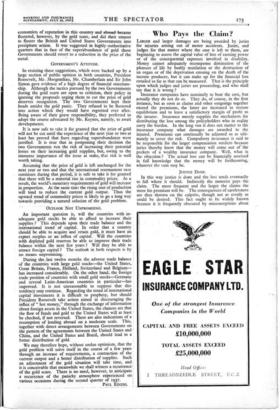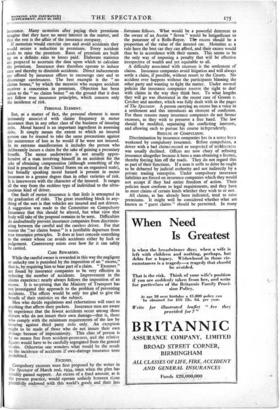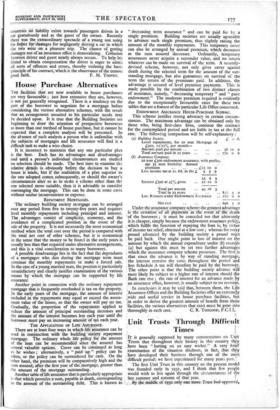Who Pays the Claim?
LARGER and larger damages are being awarded by juries for injuries arising out of motor accidents. Juries, and judges for that matter where the case is left to them, are beginning to assess the capital value of loss of earning power or of the consequential expenses involVed in disability. Money cannot adequately recompense diminution of the pleasure of life by bodily mutilation or the destruction of an organ or of the deprivation ensuing on the death of the income producer, but it can make up for the financial loss entailed so far as that can be measured. That is the principle upon which judges and juries are proceeding, and who shall say that it is wrong ?
Insurance companies have nominally to bear the cost, but actually they do not do so. They do, of course, in the first instance, but as soon as claims and other outgoings together exceed the premiums, the latter are increased to restore equilibrium and to leave a satisfactory margin of profit to the insurer. Insurance merely supplies the mechanism for distributing the loss among the policyholders who in reality carry the burden. In the long run it does not matter to the insurance company what damages are awarded to the injured. Premiums can continually be adjusted so as ulti- mately to cover the risk. Compulsory insurance is said to be responsible for the larger compensation verdicts because juries thereby know that the money will come out of'the pockets of a wealthy insurance company. Well, what is the objection ? The actual loss can be financially assessed in full knowledge that the money will be forthcoming, whatever the sum may be.
JUSTICE DONE.
In this way justice is done and the loss tends eventually to fall where it should. Indirectly the motorist pays the claim. The more frequent and the larger the claims the more his premium will be. The consequences of carelessness are thus thrown on the culprits, though not as evenly as could be desired. This fact ought to be widely known because it is frequently obscured by misconceptions about insurance. Many motorists after paying their premiums imagine that they have no more interest in the matter, and that the rest is the affair of the insurance company. If motorists would exercise care and avoid accidents they would secure a reduction in premiums. Every accident tends to raise the premium. Rates of premium are built up on a definite ratio to losses paid. Elaborate statistics are prepared to ascertain the data upon which to calculate the premium. Insurance does therefore operate to induce care and thereby to diminish accidents. Direct inducements are offered by insurance offices to encourage care and to discourage carelessness. The best example is the " no claims bonus," by which the motorist who escapes accident receives a concession in premium. Objection has been taken to the " no claims bonus " on the ground that it does not follow true insurance principles, which concern only the incidence of risk.
PERSONAL ELEMENT.
But, as a matter of fact, the personal element is more intimately associated with claims frequency in motor insurance than in any other class of the business of insuring risks. Moral hazard is an important ingredient in assessing risks. It simply means the extent to which an insured person can be trusted to take the same precautions against the occurrence of loss as he would if he were not insured. In its extreme manifestation it includes the person who deliberately incurs a claim for the sake of gaining a pecuniary benefit. The motor underwriter is not usually appre- hensive of a man involving himself in an accident for the sake of obtaining compensation (although something of the kind is practised in the United States on an organised scale), but broadly speaking moral hazard is present in motor insurance to a greater degree than in other varieties of risk. It is interwoven with the character of the insured. It ranges all the way from the reckless type of individual to the ultra- cautious kind of driver.
One fault of motor insurance is that little is attempted in the graduation of risks. The great stumbling block to any- thing of the sort is that vehicles are insured and not drivers. A suggestion was made to the Committee on Compulsory Insurance that this should be altered, but what view that body will take of the proposal remains to be seen. Difficulties do undoubtedly prevent insurance companies from discrimin- ating between the careful and the careless driver. For that reason the "no claims bonus" is a justifiable departure from true insurance principles. It does at least concede something to the owner whose car avoids accidents either by luck or judgement. Controversy exists over how far it can safely be carried.
CARE REWARDED.
While the careful owner is rewarded in this way the negligent or unlucky one is punished by the imposition of an " excess," that is, by requiring him to bear part of a claim. " Excesses " are found by insurance companies to be very effective in reducing the number of accidents. Improvement in the claims experience nearly always follows the imposition of an excess. It is surprising that the Ministry of Transport has not investigated this approach to the problem of preventing accidents. The offices would be only too glad to give the benefit of their statistics on the subject.
Men who deride regulations and exhortations will react to anything that affects their pockets. Insurance men are aware by experience that the fewest accidents occur among those drivers who do not insure their own damage—that is, those who comply with the minimum requirements of the law by insuring against third party risks only. An exception ought to be made of those who do not insure their own damage because of impecuniosity. This class of person is by no means free from accident-proneness, and the relative figures would have to be carefully segregated from the general results. Otherwise one wonders what would be the result on the incidence of accidents if own-damage insurance were prohibited.
EXCESSES.
Compulsory excesses were first proposed by the writer in The Spectator of March znd, 1934, since when the plan has steadily gained support. An excess of a fixed amount, as is the present practice, would operate unfairly between tiazke Plentifully endowed with this world's goods and their less fortunate fellows. What would be a powerful deterrent to the owner of an Austin " Seven " would be insignificant to the possessor of a Rolls-Royce. The excess should be a proportion of the value of the insured car. Motorists as a rule have the best car they can afford, and their excess would thus be in accordance with their means. This seems to be the only way of imposing a penalty that will be effective irrespective of wealth and yet equitable to all.
A difficulty associated with excesses is the settlement of claims. Insurance companies avoid litigation and will always settle a claim, if possible, without resort to the Courts. No accident ever happens without the participants blaming the other party and wanting to fight the matter. Under normal policies the insurance companies reserve the right to deal with claims in the way they think best. To what lengths they will go was illustrated in the recent case of Groom v. Crocker and another, which was fully dealt with in the pages of The Spectator. A person carrying an excess has a voice in a settlement and this introduces an element of confusion. For these reasons many insurance companies do not favour excesses, as they wish to preserve a free hand. The law should be modified, separating the conflicting interests, and allowing each to pursue his course independently.
RESULTS OF COMPULSION.
Discrimination by insurance companies has in a sense been weakened by compulsory insurance. Before compulsion, a driver with a bad claims-record or suspected of recklessness was usually declined. Offices are now chary of refusing insurance altogether because it bans a man obtaining a licence, thereby forcing him off the roads. They do not regard this as part of their functions. If a man is unfit to drive he ought to be debarred by judicial authority and not indirectly by a private trading enterprise. Under compulsory insurance liabilities are forced on insurance companies which they would not accept if they had entire freedom of action. Their policies must conform to legal requirements, and they have to meet claims of certain kinds whether they wish to or not.
All claims, as has already been indicated, tend to raise premiums. It might well be considered whether what are known as " guest claims " should be permitted. In many countries no liability exists towards passengers driven in a car gratuitously and as the guest of the owner. Recently there was the extraordinary spectacle of a young son suing his father for-damages for -negligently driving a car in which the two were on a pleasure trip. The chance of getting damages out of an insurance office is demoralising. Collusion between driver and guest nearly always occurs. - To help his friend to obtain compensation the driver is eager to admit all sorts of offences and errors, thereby violating the basic principle of his contract, which is the observance of the utmost
































































 Previous page
Previous page